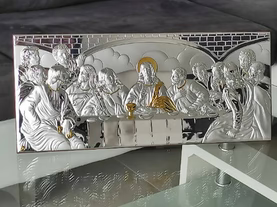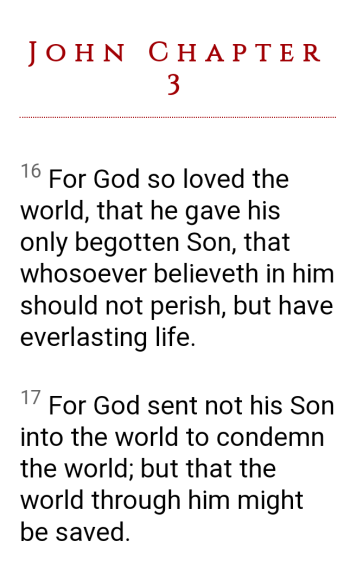Your problem is that you're thinking as a human, "they were perfect, they deserve to die and stay dead!" But you need to look at the scriptures, and not only what they say, but what they mean.Cannot agree there.....Adam's children had no choice but to be born with inherited sin, so Christ came to redeem Adam's children....there can be no redemption for Adam and his wife who had no inherited imperfection to blame for their disobedience. It was willful and deliberate and he was responsible for the death of all of his offspring, making him accountable as a manslayer and complicit along with the devil, because the devil could never have become a manslayer without being aided an abetted by Adam. The woman was deceived....but Adam wasn't, so it was his actions that condemned his children. He is not forgivable because Jesus did not die to save the murderer.
The reason everyone is born in sin and dies is because of Adam. Rom 5:12 says, “…just as through one man sin entered into the world and death through sin, and thus death spread to all men because they had all sinned-.” (NWT). When Adam disobeyed, he lost his right to live and he lost his family’s right to live.Yes, a ransom is payment for the return of something valuable. In our case, the value had to be equivalent.....'a sinless life for a sinless life'.
This is also the principle behind redemption. How the redemption laws worked in Israel showed how someone in debt could be released from the servitude it demanded, if the debt could not be paid. A generous benefactor could pay the debt and free the person from servitude to the creditor. If his children were also in servitude which happened when the debt was large, they too could go free.
Cannot agree with that because the 'separation of the sheep and the goats' happens before the millennium begins. The goats fail to support Christ's "brothers" who are still in the flesh. So they are bound for the place that God has reserved for the devil and his demons, but who will only go to that place of no return after the final test at the end of the thousand year reign of the Kingdom.
Matt 25:31-36; 40...
“When the Son of man comes in his glory, and all the angels with him, then he will sit down on his glorious throne. 32 All the nations will be gathered before him, and he will separate people one from another, just as a shepherd separates the sheep from the goats. 33 And he will put the sheep on his right hand, but the goats on his left.
34 “Then the King will say to those on his right: ‘Come, you who have been blessed by my Father, inherit the Kingdom prepared for you from the founding of the world."
Then he identifies why some are counted as "sheep" and others are "goats"...
"For I became hungry and you gave me something to eat; I was thirsty and you gave me something to drink. I was a stranger and you received me hospitably; 36 naked and you clothed me. I fell sick and you looked after me. I was in prison and you visited me.’ . . . .
‘Truly I say to you, to the extent that you did it to one of the least of these my brothers, you did it to me.’"
So the sheep are those who supported Christ's brothers on earth, and he counts those acts as being done to himself.....but the goats, do the opposite...they fail to support Christ's "brothers" because they don't believe that they are Christ's brothers, and so do not warrant such treatment.
When they ask how they had failed, Jesus says to the goats....
"‘Truly I say to you, to the extent that you did not do it to one of these least ones, you did not do it to me.’ 46 These will depart into everlasting cutting-off, but the righteous ones into everlasting life.”
So not all who are alive today professing to be Christians, will pass that separation on the right side. (Matt 7:21-23) "Everlasting cutting off" means eternal death.
Under Moses’ Law, justice demanded “a life for a life.” This was God’s perfect law. If a man killed someone, he must pay with his own life: a life for a life. (Exodus 21:23-25; Deuteronomy 19:21). Jehovah solved the problem by satisfying justice with the Ransom price of Jesus perfect human life paid for Adam’s lost perfect human life.
The Apostle Paul uses the Greek word anti-lutron, signifying, “a corresponding price,” saying, “The man, Christ Jesus, gave himself a ransom [anti-lutron—corresponding price] for all, to be testified in due time.” 1 Tim. 2:6. The Greek word lutroo is rendered “redeemed.” Prof. Young defines lutroo to signify “to loose by a price”—that is, to set free by the payment of a price. The basis or root of this word is lutron, which, as noted above with anti, used either as a prefix or a suffix, signifies a corresponding price.
Put in simple terms, Ransom means that something was lost and that you have to pay something of equal value to get it back.
Salvation comes by substitutionary atonement. One man, Jesus Christ, died for one man, Adam, so that Adam and all his posterity might live. The Apostle Paul outlines this concept of substitutionary atonement in two passages:
“For since by man came death, by man came also the resurrection of the dead. For as in Adam all die, even so in Christ shall all be made alive.” Corinthians 15:21, 22
“But not as the offence, so also is the free gift. For if through the offence of one many be dead, much more the grace of God, and the gift by grace, which is by one man, Jesus Christ, hath abounded unto many.” Rom. 5:15
Since the first man, Adam, was a perfect human being, it follows that Jesus, as a corresponding price, must also be a perfect human being and that the resultant life for Adam’s posterity must be perfect human life.
As Adam, through disobedience, forfeited his life, so Jesus, by his death, as a corresponding price, paid a full and exact offset for Father Adam’s life, and in consequence for all Adam’s posterity—every human soul—sharers in his fall and in his loss. With Adam redeemed, all his posterity are entitled to a resurrection from the dead to human perfection and a trial for life under the favorable conditions of Paradise Earth.
Until Jesus came, no human man could provide that Ransom price, because they were all sinners. No one was the perfect human equivalent of Adam.
Psalms 49:7 (NASV) “No man can by any means redeem his brother Or give to God a ransom for him”
Romans 3:10 (NKJV) “There is none righteous, no, not one”
Job spoke prophetically of Jesus Ransoming mankind and resulting in their restoration back to life and youth.
Job 33:23-25 (NASV) 23 “If there is an angel as mediator for him, One out of a thousand, To remind a man what is right for him, 24 Then let him be gracious to him, and say, ‘Deliver him from going down to the pit, I have found a ransom’; 25 Let his flesh become fresher than in youth, Let him return to the days of his youthful vigor”





